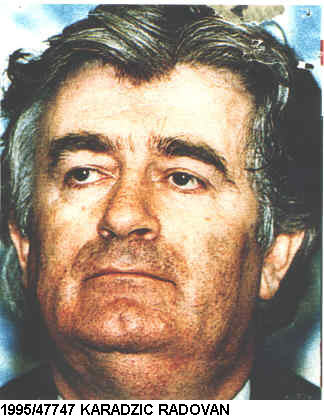 |
Genocide and RS - II. Karadžic 'will be handed over soon'
by Ian Traynor, Zagreb
Radovan Karadžić, the former Bosnian Serb leader wanted for genocide, could be arrested and transferred for trial in The Hague by the end of the month, Carla Del Ponte, the UN's chief prosecutor for war crimes in the former Yugoslavia, said at the weekend. Ms Del Ponte's comments, which elicited cynicism in Sarajevo, followed the first admission by the Bosnian Serb authorities that Bosnian Serbs had perpetrated war crimes in Srebrenica in 1995, when about 8,000 Muslim males were killed.  Under intense international pressure and after years of denials, an official Bosnian Serb panel reported that the military and police were responsible for the mass murder. Under intense international pressure and after years of denials, an official Bosnian Serb panel reported that the military and police were responsible for the mass murder.
In a lengthy ruling recently, appeal judges in The Hague put an end to years of argument by defining the Srebrenica killings as genocide. Mr Karadžić and his military commander, General Ratko Mladić, have been indicted for genocide at Srebrenica. But neither the Serbian, nor the Bosnian Serb authorities have been willing to arrest the two men, who are viewed as war heroes at home. Indeed, the Bosnian Serb authorities, nine years after the crime, have yet to arrest anyone for the Srebrenica slaughter. But the Bosnian Serb report may signal a shifting climate.
‘In July 1995, several thousand Muslims were liquidated in a way that represents grave violations of international humanitarian law,’ said the report. Bosnian Serb police, military and paramilitary units took part in the killings, it added. It also provided information on 32 mass graves, 11 of them previously unknown and which are believed to contain perhaps 2,000 corpses.
The unprecedented admission and the official acknowledgment of responsibility for war crimes will increase the pressure on the Bosnian Serb authorities to make arrests. This development, in turn, may have prompted Ms Del Ponte's statement that Mr Karadžić capture was imminent. There have been several failed attempts, most recently in April, by Nato peacekeepers in Bosnia to seize Mr Karadžić
In her native Switzerland, Ms Del Ponte told a news agency that the arrests of Mr Karadžić and Mr Mladić depended on the authorities in Belgrade. She is to go to New York on June 29 to tell the UN security council that the Serbian prime minister, Vojislav Koštunica, is being utterly uncooperative. ‘We have good reason to believe that Radovan Karadžić will be delivered to us by June 29,’ she said.
The Bosnian Serb report on Srebrenica is not the final word and more detail is expected next month. A year ago, the Bosnian Serbs officially reported that only 2,000 Muslim men had been killed, all of them fighters who died legitimately in battle, and it refused to accept responsibility. That verdict was denounced as a disgrace. Six months later, the Bosnian Serb authorities then admitted that a massacre had taken place, but still supplied next to no information on the perpetrators or the sites of mass graves.
As well as admitting responsibility, the new report for the first time also implicates Serbia proper in the massacre, noting that Serbian police units were ordered to take part in what it describes as a three-phase operation - attacking the Muslim enclave of Srebrenica, which was then supposed to be a UN-protected ‘safe haven’, then separating women and children from the men in the vanquished pocket, and then killing the males.
This article appeared in The Guardian (London), 14 June 2004
|